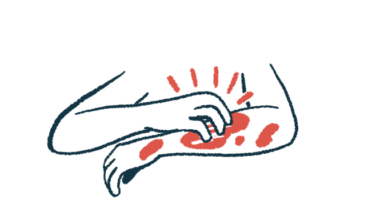TWi Biotechnology Enrolls First Patient in Phase 2 Trial Testing AC-203 for EB Treatment

596601173/Shutterstock
The first participant has been enrolled in a Phase 2 clinical trial testing AC-203 for the treatment of inherited epidermolysis bullosa (EB), the trial’s sponsor, TWi Biotechnology, announced.
AC-203 (also known as CCP-020) is a proprietary topical formulation of 1% diacerein, a compound able to inhibit factors that contribute to inflammation in EB, namely caspase-1 (CASP1) and interleukin-1 (IL-1) beta, by blocking the activation of the NLRP3 inflammasome.
TWi has partnered with Castle Creek Pharmaceuticals, which leads the global clinical development of AC-203/CCP-020 for the treatment of epidermolysis bullosa simplex (EBS). Castle Creek is conducting the global DELIVERS Phase 2 trial (NCT03154333) to evaluate the safety and effectiveness of diacerein 1% ointment as a potential treatment for EBS.
The new double-blind, proof-of-concept, Phase 2 clinical trial (NCT03468322), launched in February, will be conducted in Taiwan, and eight participants are expected to be enrolled. Patients with inherited EB age 2 and older are eligible to participate in the trial.
The effectiveness and safety of AC-203 will be evaluated, including its ability to reduce lesion surface area and number of blisters, itching and pain, and the drug’s tolerability. The trial also will test the ability of AC-203 to lower the levels of pro-inflammatory cytokines — factors that promote inflammation in the body.
In May 2018, the U.S. Food and Drug Administration granted rare pediatric disease designation to AC-203/CCP-020 for the treatment of EB.
“Because EB is a devastating disease to the patients and their caregivers, everyday life could be a struggle, especially for the families with children suffering from EB,” said Se-Meng Cheng, founder and CEO of the patient group Taiwan Debra Home Care Promotion Association. Cheng also is the mother of an EB patient.
“An effective treatment in reducing lesion would be wonderful for people affected by the disease not only in physical but also in mental and moral. We are extremely excited for TWi Biotech in developing treatment for EB patients and its decision in conducting the clinical study in Taiwan. We are looking forward to working with TWi Biotech and doctors in finding effective treatments for all EB patients and their caregivers in the world,” Cheng concluded.






